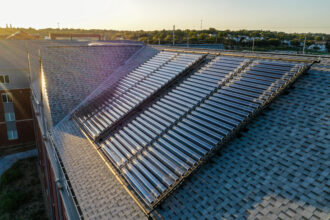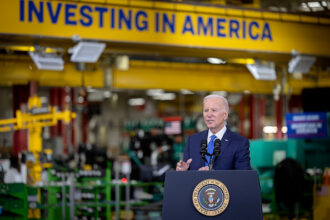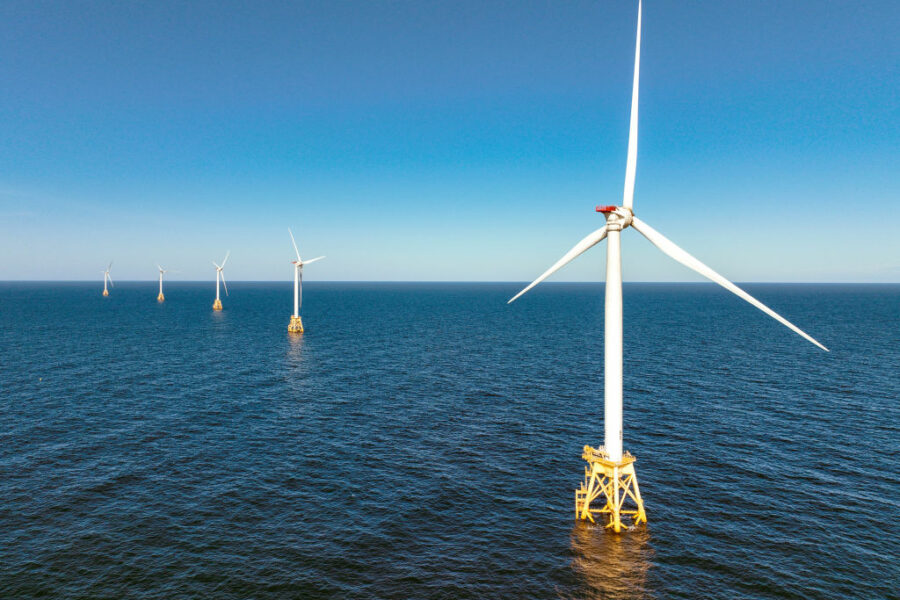As many school districts in Illinois opened their school doors for students earlier this month, some also worked to secure funds to replace their diesel school buses with low-emission buses.
Aug. 22 was the last day for school districts to apply for $400 million in grants under the U.S. Environmental Protection Agency’s Clean School Bus program. The agency updated its eligibility requirements after last year’s round of funding left out some Chicago Public Schools and other Chicago suburban school districts, many of which are in environmental justice communities that serve thousands of low-income students.
Clean transportation advocates and school leaders say it remains to be seen whether the changes were enough to ensure more low-income districts in communities that are disproportionately burdened by air pollution benefit from the available funds. Electric school buses can be up to four times more expensive than traditional school buses.
“There’s ongoing work to try to figure out what makes most sense, and EPA has been trying to address that issue,” said Susan Mudd, attorney and senior policy advocate for the Environmental Law and Policy Center. “Time will tell whether it’s perfect.”
The new funding opportunity is the second made available as part of a five-year, $5 billion investment from the 2021 Bipartisan Infrastructure Law to replace diesel buses with cleaner alternatives to reduce greenhouse gas emissions and air pollution.
Research has shown that diesel pollution puts children at greater risk for asthma. Children riding the school bus are exposed to four times more diesel emissions than a child riding in a car in front of that bus, according to a study of diesel exhaust inside school buses.
Last year, the EPA awarded more than $906 million in rebates to more than 400 public school districts across all states and territories, replacing a total of more than 2,400 buses. While Illinois received funds to replace 119 buses, only one district in the Chicagoland area received funds. Several Chicago-area school districts that do not own their own buses or have many low-income students weren’t eligible for rebates. Critics called out the program for leaving out several low-income school districts, Energy News Network reported last year.
They said the agency’s prioritization model prevented districts with thousands of predominantly Black and brown students from low-income households from having a good shot at securing funds. Eligible school districts had to have at least 20 percent of their student population below the poverty line, leaving large school districts with high numbers of students in low-income households out of the priority list, including Chicago Public Schools. Not being prioritized could mean the applicant is less likely to be awarded funds or could receive lower grant amounts.
Illinois lawmakers and other clean transportation advocates argued that Chicago Public Schools serve more low-income students than the entire student body in many districts included on the priority list and that many Chicago students face a disproportionately higher air pollution burden. The district serves over 65,000 low-income students, 19.9 percent of the total student enrollment. Unable to meet the 20 percent threshold, the district was not prioritized for funding.
In the latest grant opportunity, Title 1 school districts, those that receive federal financial assistance for schools with high numbers or percentages of children from low-income families, are now also being prioritized for the program. Large public school districts with more than 35,000 students or 45 schools that are low-income can go through a self-certification process to be added to the priority list. Chicago Public Schools was on this year’s priority list and confirmed it applied for Clean School Bus grants.
School district leaders and clean transportation advocates also pushed back on a requirement to make school districts scrap diesel buses before accessing funds for new low-emissions buses. They said it is a significant barrier to districts that don’t own their own buses and that the requirement prevents districts that wish to own their own bus fleet from using program funds to do so.
Last year, 14 Illinois lawmakers urged the EPA in a letter to expand eligibility requirements and improve accessibility, saying the scrappage requirement runs contrary to the intention of the program to reduce harmful emissions for as many schools as possible.
“Districts will have to spend time seeking and potentially paying for a bus (or buses) to scrap when their time and resources would more productively be spent working with utilities to identify and plan for building up charging infrastructure,” the lawmakers wrote.
Keep Environmental Journalism Alive
ICN provides award-winning climate coverage free of charge and advertising. We rely on donations from readers like you to keep going.
Donate NowThe agency adjusted eligibility to allow districts to scrap buses they don’t operate by entering an agreement with operators and contractors that would be willing to get rid of their diesel buses. However, some argued it was a time and financial burden for low-resource schools. School districts that could not find a third party to apply with or that are looking to own their own electric school bus fleet couldn’t get rebates.
In this year’s grant opportunity, school districts may be exempt from the scrappage requirement under four conditions: that the school district is prioritized as low-income; it is seeking to purchase only zero-emissions buses; it contracts with a private fleet that owns its own school buses and the school plans to own the new buses; and the contracted provider attests that they are unwilling or unable to replace the buses serving the district with electric school buses.
Mudd of the Environmental Law and Policy Center said the last condition maintains the barrier for school districts looking to own their own fleets and makes school districts rely on school bus operators.
Prairie Hills School District, which sits in a southern suburb of Chicago, did not apply for either round of funds because it doesn’t own its own fleet, according to district officials. The majority of the students the district serves are from low-income households.
Cook-Illinois Corporation, a school transportation operator, could be scrapping dozens of its diesel buses by next year if awarded funds from the Clean School Bus grants. John Benish, the company’s chief operating officer, said the operator partnered with school districts on the South Side of Chicago and on the North Side, some of which were not on last year’s priority list, seeking 15 to 20 school buses for each district. If awarded the grants, the operator would purchase the electric buses from Lion Electric, a zero-emission vehicle manufacturer that opened a manufacturing plant in July in Joliet, Illinois, southwest of Chicago.
Under the latest round of clean school bus grants, a single school district can apply for funds for up to 50 school buses, and third parties can apply for up to 100 to serve at least four school districts.
Tim Farquer, the founder of Bus-2-Grid Initiative, said he expects at least 50 Illinois school districts to apply for at least 200 new electric school buses. The initiative is a regional coalition of school leaders, school bus operators, clean transportation advocates and others promoting clean-energy school transportation.
The EPA plans to announce the 25 to 50 applicants selected by January 2024 and award the funds by March 2024. School districts will be able to apply for more funds to accelerate the rollout of electric school buses this fall from the proceeds of a legal settlement with Volkswagen through the Illinois Environmental Protection Agency. Another round of Clean School Bus rebates is expected to become available again by the end of 2023.


















